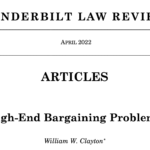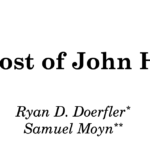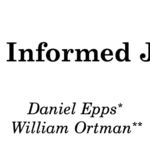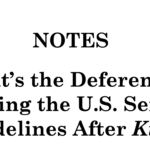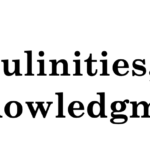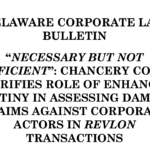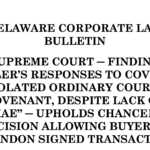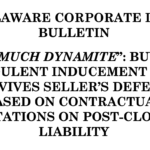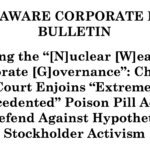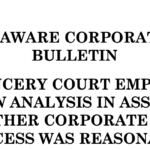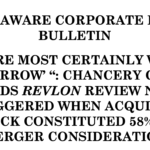April, 2022
High-End Bargaining Problems
Apr. 21, 2022—William W. Clayton | 75 Vand. L. Rev. 703 (2022) | Many important areas of the law place great confidence in the ability of contracting parties to bargain effectively. In this Article, I question the wisdom of a formalistic faith in bargaining by identifying flaws in the bargaining process at the high end of the market,...
The Ghost of John Hart Ely
Apr. 21, 2022—Ryan D. Doerfler & Samuel Moyn | 75 Vand. L. Rev. 769 (2022) | The ghost of John Hart Ely haunts the American liberal constitutional imagination. Despite the failure long ago of any progressive constitutional vision in an increasingly conservative Supreme Court, Ely’s conjectures about the superiority of judges relative to legislatures in the protection of...
The Informed Jury
Apr. 21, 2022—Daniel Epps & William Ortman | 75 Vand. L. Rev. 823 (2022) | The right to a criminal jury trial is a constitutional disappointment. Cases almost never make it to a jury because of plea bargaining. In the few cases that do, the jury is relegated to a narrow factfinding role that denies it normative voice...
What Property Does
Apr. 21, 2022—Christopher Serkin | 75 Vand. L. Rev. 891 (2022) | For centuries, scholars have wrestled with seemingly intractable problems about the nature of property. This Article offers a different approach. Instead of asking what property is, it asks what property does. And it argues that property protects people’s reliance on resources by moderating the pace of...
What’s the Deference? Interpreting the U.S. Sentencing Guidelines After Kisor
Apr. 21, 2022—Liam Murphy | 75 Vand. L. Rev. 957 (2022) | For more than three decades, the U.S. Sentencing Guidelines have constrained the punishment doled out by federal judges, limiting discretion that was once nearly unlimited and bringing standardization to the penological decisionmaking process. For twice as long, the Supreme Court has constrained judges in a different...
Policing, Masculinities, and Judicial Acknowledgment
Apr. 21, 2022—Nicholas J. Prendergast | 75 Vand. L. Rev. 997 (2022) | In the 1980s, the Supreme Court held that courts must consider the “totality of the circumstances” when deciding the reasonableness of a police officer’s conduct in an excessive force suit. To this day, the precise meaning of “reasonableness” remains elusive. For years, courts around the...
“NECESSARY BUT NOT SUFFICIENT”: CHANCERY COURT CLARIFIES ROLE OF ENHANCED SCRUTINY IN ASSESSING DAMAGES CLAIMS AGAINST CORPORATE ACTORS IN REVLON TRANSACTIONS
Apr. 11, 2022—Robert S. Reder & Connor J. Breed | 75 Vand. L. Rev. En Banc 145 (2022) | Also explains that preliminary steps taken by self-interested corporate officers to tilt playing field for benefit of favored bidder may invite application of Revlon principles several months before board approval of sale transaction. PDF Download Link AUTHORS: Robert...
SUPREME COURT ─ FINDING SELLER’S RESPONSES TO COVID-19 VIOLATED ORDINARY COURSE COVENANT, DESPITE LACK OF “MAE” ─ UPHOLDS CHANCERY DECISION ALLOWING BUYER TO ABANDON SIGNED TRANSACTION
Apr. 11, 2022—Robert S. Reder & Erin N. Embrey | 75 Vand. L. Rev. En Banc 133 (2022) | Disregarding similar measures taken by other industry participants in response to pandemic, Court finds that seller’s failure to obtain buyer’s consent to drastic (albeit reasonable) measures as required by sale agreement violated Ordinary Course Covenant. PDF Download Link...
“TOO MUCH DYNAMITE”: BUYER’S FRAUDULENT INDUCEMENT CLAIM SURVIVES SELLER’S DEFENSE BASED ON CONTRACTUAL LIMITATIONS ON POST-CLOSING LIABILITY
Apr. 11, 2022—Robert S. Reder & Zachary R. Ryan | 75 Vand. L. Rev. En Banc 123 (2022) | Chancery Court permits buyer to challenge allegedly fraudulent representations in purchase agreement, despite “remarkably robust” contractual provisions designed to shield seller and its affiliates from post-closing liability. PDF Download Link AUTHORS: Robert S. Reder Zachary R. Ryan
Defusing the “[N]uclear [W]eapon of [C]orporate [G]overnance”: Chancery Court Enjoins “Extreme, Unprecedented” Poison Pill Adopted to Defend Against Hypothetical Stockholder Activism
Apr. 11, 2022—Robert S. Reder & Lisa Orucevic | 75 Vand. L. Rev. En Banc 109 (2022) | Chancery Court confirms that boards must justify adoption of an “extreme” form of stockholder rights plan based on actual threats perceived at the time of adoption, not on the possibility of “hypothetical future threats.” PDF Download Link AUTHORS: Robert...
CHANCERY COURT EMPLOYS REVLON ANALYSIS IN ASSESSING WHETHER CORPORATE SALE PROCESS WAS REASONABLE
Apr. 11, 2022—Robert S. Reder & Connor J. Breed | 75 Vand. L. Rev. En Banc 97 (2022) | The court carves out role for enhanced scrutiny review while recognizing that personal liability requires defendant-by-defendant analysis. PDF Download Link AUTHORS: Robert S. Reder Connor J. Breed
“THERE MOST CERTAINLY WAS A ‘TOMORROW’”: CHANCERY COURT FINDS REVLON REVIEW NOT TRIGGERED WHEN ACQUIRER STOCK CONSTITUTED 58% OF MERGER CONSIDERATION
Apr. 11, 2022—Robert S. Reder & Connor J. Breed | 75 Vand. L. Rev. En Banc 87 (2022) | Opinion also indicates that technical noncompliance with DGCL § 203 will not trigger supermajority voting requirements for a negotiated transaction not subject to “abusive takeover tactics.” PDF Download Link AUTHORS: Robert S. Reder Connor J. Breed
